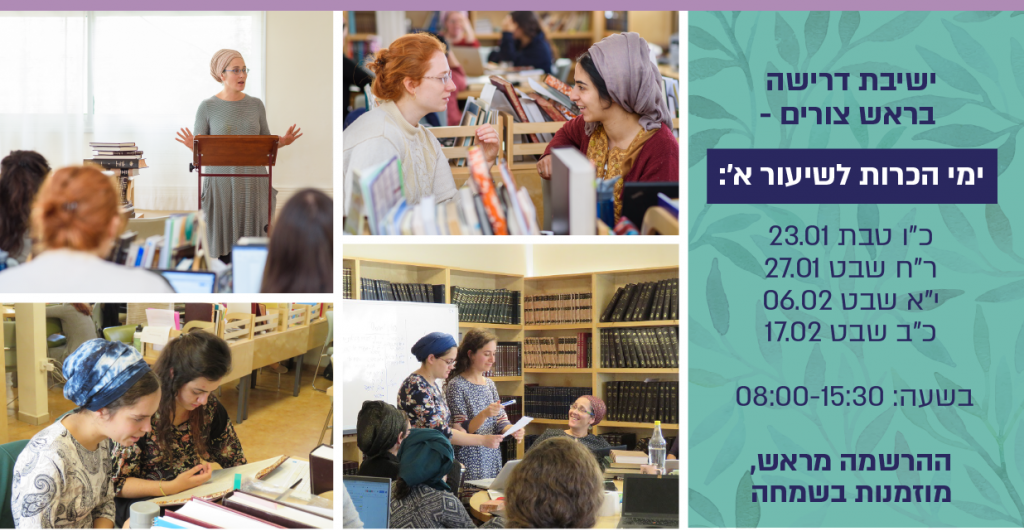About Yeshivat Drisha
The mission of the yeshiva is to enable women to achieve the highest levels of Torah learning by fostering their development as talmidot chakhamim and cultivating intellectual, religious, and personal depth. We do that in the following ways:
- We offer a Gemara curriculum of five sidrei iyyun and four sidrei bekiut a week. All classes include seder as well as shiur, where students first prepare the sources b’chavruta in the Beit Midrash before reviewing and enriching their understanding in class.
- Each student is personally mentored by Yeshiva staff to cultivate the development of strong skills and deep and nuanced understanding of the materials studied. This caring, pedagogical approach is core to our mission.
- We are a small, intimate Beit Midrash community.
- Our Rosh Yeshiva and almost the entirety of our staff are female, and their deep and ongoing learning is a source of inspiration for all students.
- Though the Yeshiva’s language of instruction is Hebrew, the Beit Midrash staff includes English-speaking faculty who meet with students, as needed, to support understanding and integration of the material learned in shiur. As such, supplemental review shiurim are provided in English to ensure that nothing gets lost in translation.
The three pillars of our yeshiva are Torah study, Tefillah and commitment to mitzvot. The yeshiva approaches all of these with intensity.
- Torah: Yeshivat Drisha offers an unparalleled curriculum of Talmud study, featuring five sidrei iyyun and four sidrei bekiut each week for all students. Our unique pedagogical approach involves personal mentorship by staff to ensure that students understand and internalize the skills and materials covered.
- Tefillah: Although there is no minyan, all students and faculty in the Beit Midrash daven together as one community three times a day. Our Tefillah is enriched by faculty-led hachana l’tefillah, which sets a tone of mindfulness and seriousness for davening.
- Commitment to Mitzvot: We believe that our students’ observance of mitzvot should flow from their serious Torah study and deep understanding of halakhah. The Yeshiva environment cultivates full observance of all areas of halakhic practice.
Each member of our faculty has learned in multiple Batei Midrash and some have academic training as well. They bring a variety of methods and tools to their teaching, exposing students to the breadth of approaches as relevant to the sugya at hand. In addition to high level conceptualization, there is a strong emphasis on skill building and personal growth in learning. Our Talmud curriculum is complemented by classes on Tanakh, Halakhah and Machshava, which enriches and deepens students’ appreciation for the topics covered in the sugyot.
Daily Life
Rabbanit Yael is our Covid point-person who is in constant contact with representatives from the Ministry of Health and the Ministry of Education to ensure that we are always following the most recent guidelines. She gives a Covid orientation on the first day, and is the person to whom students and staff members turn with questions or concerns that come up during the year. We have designated quarantine areas, and should a student be required to quarantine at any point, we will provide her with food and Zoom access to shiurim as well.
The Yeshiva provides three meals a day to all students. Students also have access to the Yeshiva’s student kitchen which is equipped with a stove, oven, and microwave.
Each room is furnished with new beds and individual closets for each student. Each unit is equipped with a mini fridge and kettle. There is internet access throughout the Yeshiva’s facilities. There are communal laundry machines, free of charge, which are conveniently located.
Each dormitory unit houses two bedrooms and is shared between overseas students and Israelis. Overseas students will be offered their own room.
The cost of the program is $25,000. Need based financial aid is available.
While learning is the main focus of the Yeshiva, learning about Eretz Yisrael is also a key part of the Shana Alef experience. The Yeshiva goes on a couple of larger trips around Israel throughout the year, and smaller, local outings are offered on Fridays when Shabbatot are spent in the Yeshiva. Due to the focus on learning, the larger trips are reserved for bein hazmanim. Students will also have opportunities to visit the home communities of their Israeli classmates, gaining an insider’s view into many different parts of the land.
The Yeshiva does not conduct its own Poland trip, but will make arrangements for interested students to join on another seminary’s trip, depending on circumstances surrounding the COVID-19 pandemic.
Shavuot, Simchat Torah, and Channuka will be celebrated together at the Yeshiva, as well as one Shabbat every 2-3 weeks. Additionally, students are always welcome to stay in their dorms and join for meals and Tefillot with married students or members of the Kibbutz. Yeshiva staff will make sure that every student always has somewhere to go for Shabbatot and holidays.
There are buses to and from Jerusalem and Beit Shemesh which stop at Tzomet HaGush, where the mall is. There is also a bus to and from Efrat where there is more shopping and restaurants.
No. This is your home, we do not give it to others.
No. We believe in building trusting adult relationships in a small, warm and supportive environment. However, it is expected that students are informing someone when they leave the kibbutz.
Students taking a full course load will be provided with a transcript. We are currently working with YU to ensure that students will receive credit.
Yes.
Yes. Our teachers and staff are tremendously invested in each student, and the relationships they will build and continue to nurture between them.

